Primodos 2024: The Quest for Justice Continues
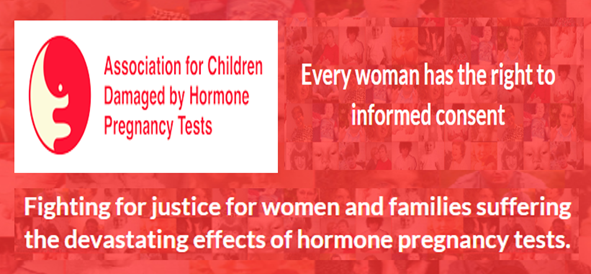
Image courtesy: The Association for Children Damaged by Hormone Pregnancy Tests (ADCHPT).
In the aftermath of the extensive legal battle involving over 100 claimants affected by Hormone Pregnancy Tests (HPTs) and defendants including Bayer Pharma AG, Schering Healthcare Limited, Aventis Pharma Limited, and the Secretary of State for Health and Social Care, the reverberations persist.
Since Mrs Justice Yip's judgement on 26th May 2023, denouncing the proceedings as an 'abuse of process', our attention shifted towards examining the ongoing consequences of the Primodos scandal.
As the forthcoming Annual General Meeting of the Association for Children Damaged by Hormone Pregnancy Tests (ADCHPT) is due to take place in Birmingham on 22nd June 2024, recent developments are scrutinised against the backdrop of legal discourse.
A mere three months following the collapse of the high court battle, Sky News reported that claimants faced potential liability for costs exceeding £10 million. Lawyers representing the government's Department of Health and pharmaceutical giant Bayer delivered a stark ultimatum: agree to forego any future legal action or risk shouldering substantial bills. This ultimatum, labelled as ‘bullying and intimidation’ by Marie Lyon, Chairwoman of the Association for Children Damaged by Hormone Pregnancy Tests (ACDHPT), left Primodos-affected families facing an agonising choice: surrender their right to seek justice or face financial ruin.
While Minister for Women's Health Maria Caulfield's offer to meet with affected families may suggest a willingness to address their concerns, the harsh reality remains unchanged. Despite Maria Caulfield’s reluctance to witness individuals deprived of justice due to financial constraints, systemic barriers within the legal system persist, perpetuating inequality.
The defendants—Bayer Pharma AG, Schering Healthcare Limited, Aventis Pharma Limited, and the Secretary of State for Health and Social Care—enjoyed privileged access to the legal system due to their vast financial resources, whereas Primodos-affected families encountered daunting financial obstacles.
The demand by the government's Department of Health and Bayer to quash future legal claims underscores a troubling prioritisation of legal closure over factual scrutiny. This demand requires claimants to forego any future legal action, disregarding contestations (inconsistencies, alterations, contradictions, discrepant findings, and omissions) within the available scientific data at the time (as evidenced by the IMMDS Review Oral Hearing, Sky News Interview, and MP letter), regardless of potential future evidence.
This highlights a disturbing trend where the interests of powerful elites eclipse the pursuit of truth and justice. Let us not overlook that the Expert Working Group (EWG) chose to exclude the summary estimate from its report, notwithstanding twelve out of fifteen estimates indicating an association between Primodos and malformations (as evidenced below).
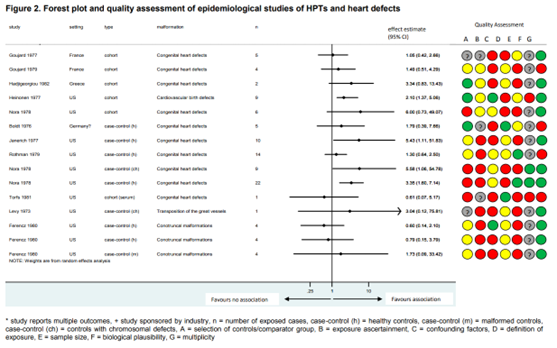
Image courtesy: All-Party Parliamentary Group Hormone Pregnancy A Bitter Pill: Primodos, The Forgotten Thalidomide report – published 27th February 2024, p.20.
Let us not ignore the alterations made to the draft by individuals not affiliated with the Expert Working Group and Commission on Human Medicines (CHM), which raise legitimate concerns about external interference.
Let us also remember that the Expert Working Group’s report played a pivotal role in the court case involving over 100 Primodos-affected claimants, which was dismissed because the judgment determined that the position on causation had not "materially changed in the claimants' favour" since the previous litigation in 1982.
What led to the exclusion of the summary estimate in the meta-analysis from the Expert Working Group (EWG) report? Who stands to benefit the most from removing evidence suggesting an association between Primodos and malformations from the published report?
The Primodos injustice once again took centre stage when Sky News reported in December 2023 new scientific evidence spearheaded by Professor Bengt Danielsson. This evidence concluded that Hormone Pregnancy Tests could cause a range of congenital problems, such as malformations and defects, and initiate a failed abortion process. Faced with renewed scrutiny, Women's Health Minister Maria Caulfield committed to examining the new evidence.
On 7th February 2024, the Patient Safety Commissioner, Dr Henrietta Hughes, unveiled The Hughes Report, a comprehensive strategy for addressing harms from medicines and medical devices. Despite identifying a 'clear case for redress' for the thousands affected by 'avoidable harm', Primodos was notably absent from this review.
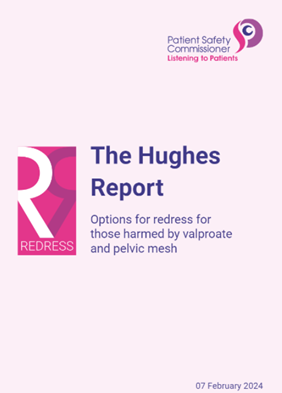
Image courtesy: Patient Safety Commissioner – Listening to patients The Hughes Report Options for redress for those harmed by valproate and pelvic mesh - published 7th February 2024
The report explicitly stated that ‘Our terms of reference did not include the issue of hormone pregnancy tests', a decision attributed to the Department of Health and Social Care (DHSC). In late 2022, Minister for Women's Health Maria Caulfield, while defining the project's terms of reference, omitted Primodos from the focus of redress, citing legal litigation as the reason. However, the case for redress for Primodos had already been established in the First Do No Harm Report. The Hughes Report aimed to explore how to provide redress options, making the exclusion of Primodos objectionable.
Marie Lyon, who attended the launch, later expressed her disappointment, stating in The Guardian, ‘I feel betrayed by the patient safety commissioner, by the IMMDS [Independent Medicines and Medical Devices Safety] review, and by the Secretary of State for Health – all three have betrayed our families because, basically, they have just forgotten us.’
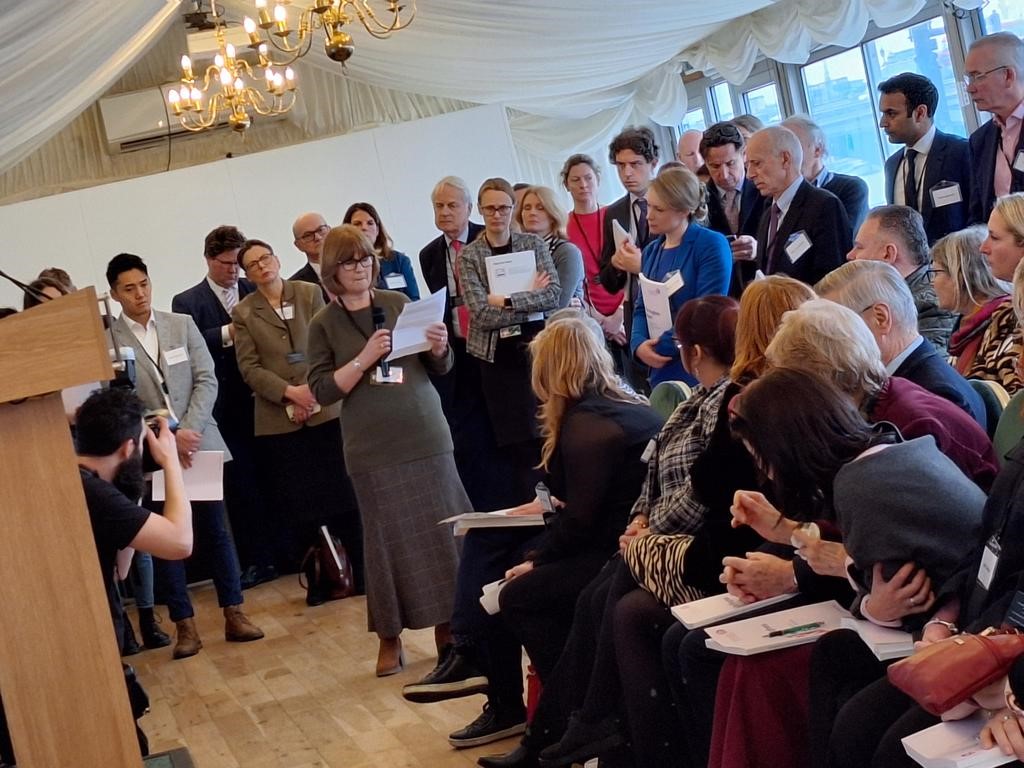
Marie Lyon speaking at the Patient Safety meeting in Parliament on 7th February 2024. Photo courtesy: Marie Lyon, ACDHPT Chairwoman.
Considering the renewed interest in Primodos sparked by the emergence of new evidence and the Minister's commitment to investigate, Professor Heneghan has remained dedicated to raising awareness about the issue. His most recent contribution, 'The Primodos Scandal - Part 6' published on 27th February 2024, builds upon the series initiated with parts 1 to 5 (Part 1, Part 2, Part 3, Part 4 and Part 5) released throughout June 2023.
These instalments presented compelling evidence and challenged the findings of the Expert Working Group Report. He emphasises the necessity for legal scrutiny of Primodos, a position Professor Heneghan continues to champion even in the face of the setbacks encountered in the court cases.
Building on this momentum, on 29th February 2024, Yasmin Qureshi, MP, officially launched the report titled “A Bitter Pill: Primodos, The Forgotten Thalidomide,” as part of the work of the All-Party Parliamentary Group (APPG) on Hormone Pregnancy Tests. The APPG on Hormone Pregnancy Tests, comprising over 133 MPs and Peers, stands as one of the largest cross-party groups in Parliament.
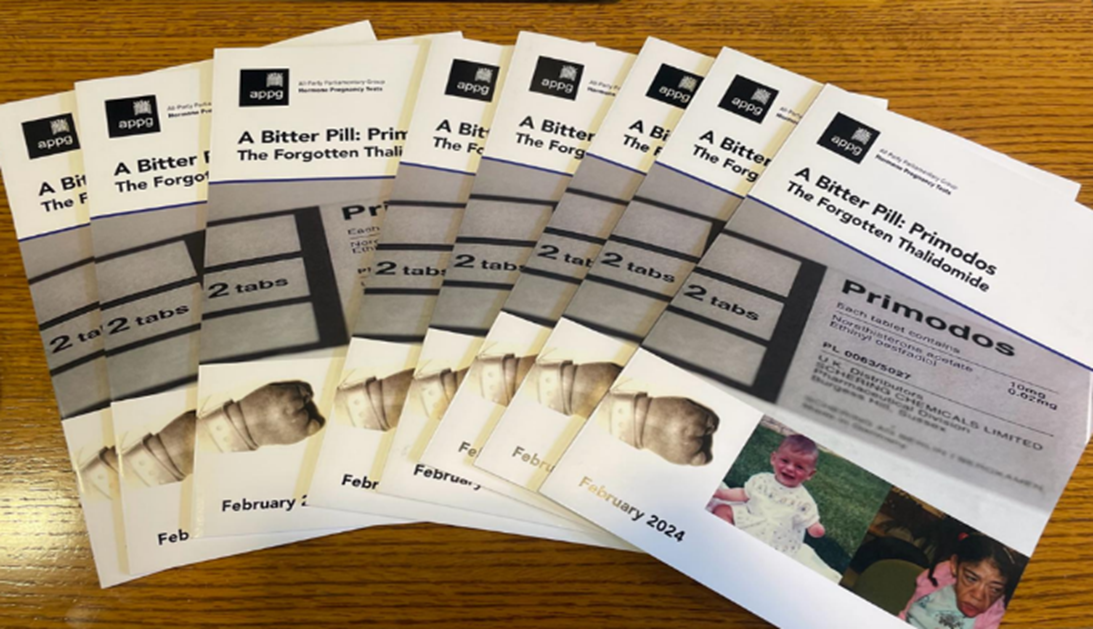
Photo courtesy: All-Party Parliamentary Group Hormone Pregnancy A Bitter Pill: Primodos, The Forgotten Thalidomide report – published 27th February 2024
It represents the collective interests of numerous constituents affected by the drug Primodos. Established in 2012 and led by Yasmin Qureshi MP, the group's primary objective is to raise awareness of the challenges faced by families impacted by Primodos.
.png)
APPG report on Primodos Scandal unveiling at Westminster on 7th February 2024. Photo courtesy: Marie Lyon, ACDHPT Chairwoman.
The launch event at Westminster introduces the APPG's report, which provides the evidence that the Government chooses to ignore, delves into the human toll of Primodos, and emphasises regulatory inadequacies, examining the Expert Working Group and The Independent Medicines and Medical Devices Safety (IMMDS) Review.
Led by Chair Yasmin Qureshi MP and Vice Chairs Hannah Bardell MP, Sir Ed Davey MP, and Sir Jacob Rees-Mogg MP, the cross-party group recommends implementing measures to address what it terms ‘one of the most significant medical frauds of the 20th century’ urging the Secretary of State to act accordingly.
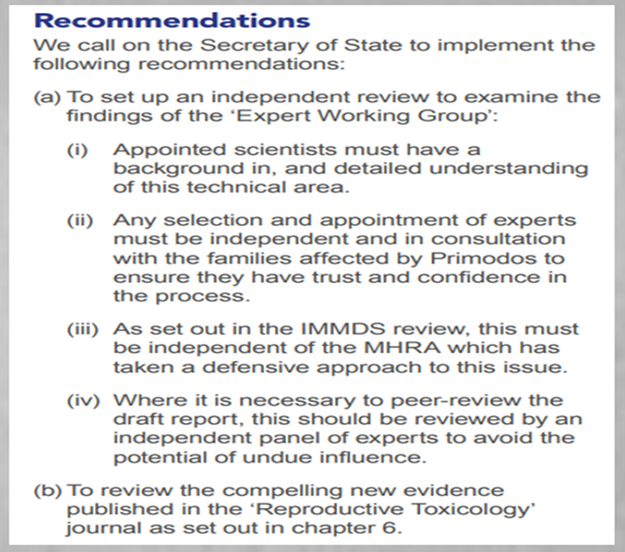
Image courtesy: All-Party Parliamentary Group Hormone Pregnancy A Bitter Pill: Primodos, The Forgotten Thalidomide report – published 27th February 2024 – Page 33
During a parliamentary debate on 18th April 2024, Yasmin Qureshi pressed Maria Caulfield on whether she would commit to commissioning an independent review of the Commission on Human Medicines’ Expert Working Group’s report on Hormone Pregnancy Tests.
In response, Maria Caulfield merely expressed ‘sympathy’ for families who ‘believe’ they have suffered due to using Hormone Pregnancy Tests, stating definitively that there are no plans to initiate an independent review of the Expert Working Group's findings.
At best, her response demonstrates a lack of proactive action to address the concerns raised. At worst, it reflects a dismissive attitude towards legitimate calls for an impartial review, potentially exacerbating distrust in the government's commitment to transparency and accountability.
Notwithstanding the government's steadfast stance, media coverage continues to shed light on the plight of Primodos-affected families. On 7th May 2024, Bristol Live published an article featuring Tracy Whiting, 53, from St George, who believes her lifelong health issues stem from the hormone pregnancy test pills her mother took while pregnant with her.
Tracy Whiting’s experiences, alongside countless others, serve as poignant reminders highlighting the human toll of this medical injustice, and the devastating impact of Primodos, amplifying the urgency for accountability. Despite persistent challenges and resistance, the voices of families impacted by Primodos and their advocates resound, calling for acknowledgement and justice.
In anticipation of the impending backbench business debate scheduled for 6th June 2024, where the All-Party Parliamentary Group (APPG) for children damaged by oral hormone pregnancy tests will convene in the Main Chamber of the House of Commons, Marie Lyon, Chairwoman (ACDHPT), has mobilised efforts to rally support from individual members of the group.
Marie has actively reached out to all 113 MPs who are part of the APPG, urging their attendance at the debate to represent their constituents' interests. This discussion, specifically focused on addressing the issues surrounding Hormone Pregnancy Tests (HPTs) with a particular emphasis on the Primodos scandal, serves as a crucial platform for raising awareness, addressing systemic failures, and demanding accountability for the injustices endured by these families.
Marie Lyon’s call to action underscores the urgency to ensure that the voices of those affected by Primodos are heard and that their quest for justice is supported at the highest levels of governance. It is crucial that everyone who believes in truth and justice watches the debate and shares what they see and hear on all social media platforms. This engagement is vital in amplifying the voices of those impacted by Primodos and in advocating for meaningful change and accountability within the healthcare system. Marie Lyon kindly provided the following statement reflecting on the urgent need to ensure that the voices of those affected by Primodos are heard and supported.
.png)
Approaching the Annual General Meeting of the Association for Children Damaged by Hormone Pregnancy Tests (ACDHPT) in Birmingham on 22nd June 2024, the imperative for action intensifies. Against the backdrop of resilience and advocacy, steadfastness is required. Each moment necessitates renewed commitment; every voice raised in solidarity strengthens the movement.
While the road ahead may be challenging, the dedication of affected families to truth and justice remains unwavering. Continuing to shine a light on the Primodos scandal ensures that the echoes of injustice are met with the resounding call for accountability, redress, and reform.
To learn more about the Association for Children Damaged by Hormone Pregnancy Tests (ACDHPT) campaign and keep up to date with news, visit primodos.org.
In addition, there are several ways you can support the campaign:
- Follow ACDHPT on Twitter
- Follow ACDHPT on Facebook
- Encourage your MP to join the APPG for hormone pregnancy tests.
- Donate to ACDHPT campaign
- Contact Marie Lyon
If you are interested in reading more about this injustice, Sharon Hartles has published several articles on the Harm and Evidence Research Collaborative blog that may be of interest:
Primodos 2023: Fighting Against the Odds - A Denied Opportunity for Justice
Primodos: Financial redress is long overdue
Primodos, Mesh and Sodium Valproate: Recommendations and the UK Government’s response
Primodos: The Next Steps towards Justice
Primodos: The first step towards Justice
Sharon Hartles, Member of the Harm and Evidence Research Collaborative, The Open University. Member of the British Society of Criminology. Affiliated with the Risky Hormones research project (an international collaboration in partnership with patient groups). Contact: sh28739@ou.ac.uk
